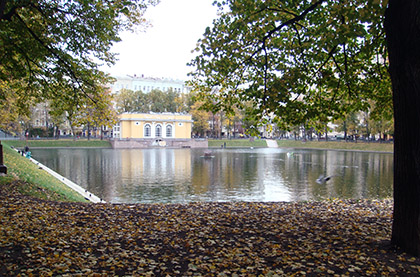
Patriarch's Pond (Патриаршие пруды), Moscow, site of the opening scene
of Master and Margarita, image credit: Perosha
It's a shame but I no longer have my photos of Bulgakov's birthplace home in Kyiv or of his apartment in Moscow. Not sure what happened to them, but they might have been lost in a flooded apartment years ago. When I was in Moscow in 1990, we visited Bolshaia Sadovaia street no. 10, apartment #50, where Bulgakov once lived and which became the setting for his novel Master and Margarita. The apartment, stairwells and hallway were grimy and filled with all kinds of graffiti celebrating Bulgakov and his novel. Stuff was scribbled, scratched and drawn everywhere in the dark corridors. It really was a fitting tribute.
See what wiki has to say about what happened recently to the apartment: "Bulgakov's old flat, and the attic of the apartment building in which parts of The Master and Margarita are set, have since the 1980s become a gathering spot for Bulgakov's fans. The numerous paintings, quips, and drawings were completely whitewashed in 2003." The flat, which has also since become a museum, was also attacked by a vandal in 2006 because of Bulgakov's use of the character of Satan in the novel. (The Russian Orthodox Church also does not have much sympathy for Bulgakov.)
I have read Master and Margarita so many times now, at least a dozen or so, and it is always a great read. Maybe it is time to re-read again about the devil's--in the guise of Woland--visit to Stalin's Moscow of the 1930s for a gala ball; Stalin's purges and terror in the actual air and the devil in the novel, yet the devil comes off as a far more sympathetic creature than Stalin ever was. I have put the book on my A Cultural History of the Last Fifty Years: An Interpretative Personal Timeline as the entry for 1988, although I might change the year of my entry. This is a book that you must read sometime.
Bulgakov was born into a rather large, well-off family in Kyiv where he eventually attended medical school. He served as a doctor during World War I and again worked as a doctor during the Russian Civil War. Most of his family left Russia as a result of the revolution and civil war, but Bulgakov was not able to leave because of an illness.
Bulgakov abandoned the idea of being a doctor and started writing plays and short stories. He settled in Moscow and achieved modest success, but eventually the satirical and critical nature of his works made it increasingly difficult for him to get published. It is weird that despite his plays critical of the Soviet regime, it has often been reported that Stalin liked Bulgakov and protected him from real trouble, i.e., prison. Bulgakov did not disappear in the purges of the 1930s, and he was allowed to do minor work for the Moscow Art Theater, but he could get none of his works published.
In these difficult conditions, Bulgakov continued to write and edit Master and Margarita, which he had begun in 1928. It became very clear that he would not be able to publish it, and it was also clear that he was terminally ill and he might not be able to finish final revisions of the novel. The book was only published in 1966/67, long after his death.
Some suggested websites
- And so we always start with the wiki entry on Bulgakov. Here's the Russian version.
- Mikhail Bulgakov in the Western World: A Bibliography
- Mikhail Bulgakov (a collection of articles from The Guardian)
- Master and Margarita
- Mikhail Bulgakov, Master and Margarita (a resource site)
- Prominent Russians: Mikhail Bulgakov
- Master and Margarita (No idea really why the site needs to play the Rolling Stones)
- Mikhail Afanasjevitch Bulgakov